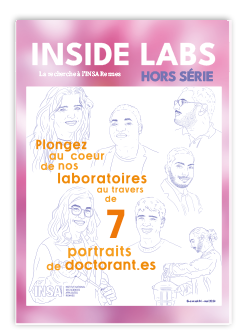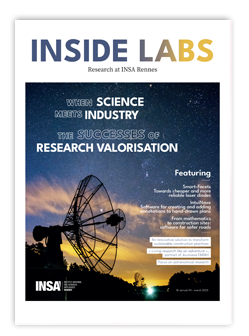Research and technological support for societal transitions
Through its major research themes, INSA Rennes is resolutely turned towards society and actively participates in environmental and societal issues.
We disseminate the results of this research to society:
- Through partnership research and the valorization of research and research products and results
- By training engineers, doctors, and continuing education
- Through the dissemination of scientific knowledge
This scientific positioning is expressed in training and research.
The 3 main areas of research at INSA Rennes
INSA Rennes conducts fundamental and applied research activities in the scientific and technical fields. It contributes to the valorization of the results obtained, the dissemination of scientific and technical information and international cooperation in many fields linked to engineering and technologies.
The research teams at INSA Rennes, by deploying original multidisciplinary approaches, are working to meet the challenges centered on the following three major themes:
- Sustainable engineering: materials and systems for sustainable energy and industrial production
- Technologies for health, well-being and quality of life
- Secure and responsible digital and communications
Our research laboratories, in partnership with several supervisory authorities including the CNRS for 5 of them
5 Research units
- FOTON Institute - Optical Functions for Information Technologies (UMR CNRS 6082)
- IETR - Institut d'Electronique et des Technologies du numéRique (UMR CNRS 6164)
- IRISA - Institute for Research in IT and Random Systems (UMR CNRS 6074)
- IRMAR - Mathematics Research Institute of Rennes (UMR CNRS 6625)
- ISCR - Institute of Chemical Sciences of Rennes (UMR CNRS 6226)
- Metallurgical Chemistry Team
- Solid State Chemistry and Materials Team
2 Research centres
- LGCGM - Laboratory of Civil and Mechanical Engineering (UR 3913)
- LFPC - La Fabrique dePensée Critique

![]()




INSA Rennes publishes its Research Magazine!
Basic research at the service of Sustainable development (N°1)
| How technology is revolutionizing healthcare, well-being and quality of life (N°2)
| Digital communications and technologies: the challenges facing society (N°3)
|
Dive into the heart of our laboratories through the portrait of 7 PhD students (N°4)
|
Dive into the heart of our laboratories through the portrait of 7 PhD students (N°5)
|







